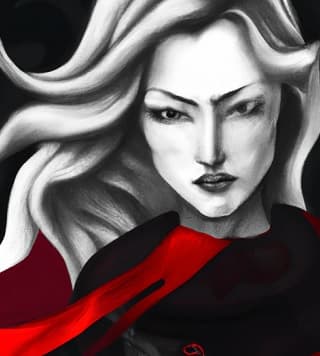Lofn - Goddess of Norse Mythology

Lofn, the Norse goddess of forbidden love and matchmaking. She is often depicted with her gentle demeanor and her ability to smooth out conflicts between lovers.
Lofn (pronounced: "LOV-n") is a Norse goddess belonging to the Æsir lineage in Norse mythology. Her name is derived from the Old Norse word "lof", which means "permission" or "mildness". Lofn is mentioned in Snorri Sturluson's Prose Edda in chapter 34 of the Gylfaginning, where she is described as the eighth of the Ásynjur, the female deities in Norse mythology.
The name "Lofn" in Old Norse runes is written as:
ᛚᚢᚠᚾ
According to Snorri, Lofn is known for her kindness and goodness, and she has been granted special permission by Odin and Frigg to join together men and women whose marriage was previously forbidden. Due to her role as a mediator of love and relationships, Lofn is highly regarded by mortals and praised in poetry and literature.
Although little else is known about Lofn, her name is frequently used in kennings, a form of metaphorical language used in Norse poetry. She is also referred to as "golden Lofn", a title which suggests her association with wealth and prosperity.
While some scholars speculate that Lofn may have been a minor deity, others argue that she was likely an important figure in Norse mythology, given her association with love and relationships. Her name and role also suggest a connection with Frigg, the goddess of marriage and fertility, and it is possible that the two goddesses were once considered to be aspects of the same deity.
Please note that the information provided about Lofn and Norse mythology is complex and may be subject to interpretation and debate. The myths and stories of Norse mythology have evolved and been passed down through oral tradition and written accounts, and there may be variations in the way they are told and understood. This information should be used as a general reference and not as a definitive source on the subject.
If you notice an error on this web page, please email us at contact@historylists.org and let us know about it. Please be sure to include a brief description of the mistake you have noticed, along with the location of the mistake on the web page (e.g., the specific section or paragraph where it appears). We appreciate your help in keeping our website accurate and will use the information you provide to make necessary updates as soon as possible. Thank you for your assistance!
Other Norse Gods and Goddesses
- Baldr (Æsir) - God of Light, Beauty, and Goodness.
- Beyla (Ásynjur) - Goddess of Agriculture.
- Bil (Ásynjur) - Associated with the Moon.
- Borr (Æsir) - Father of the Norse Gods.
- Bragi (Æsir) - God of Poetry and Song.
- Byggvir (Vanir) - God of Agriculture.
- Dagr (Æsir) - God of Day.
- Dellingr (Æsir) - God of the Dawn.
- Eir (Ásynjur) - Goddess of Healing and Protector.
- Fjörgyn (Ásynjur) - Goddess of the Earth.
- Fjörgynn (Æsir) - God Associated with the Heavens.
- Forseti (Æsir) - God of Justice and Reconciliation.
- Freyja (Vanir) - God of Love, Fertility, War, and death.
- Freyr (Vanir) - God of Fertility and Prosperity.
- Frigg (Ásynjur) - Queen of the Gods.
- Fulla (Ásynjur) - Goddess of Fertility.
- Gefjon (Ásynjur) - Goddess of Fertility.
- Gerðr (Ásynjur) - Goddess of the Earth.
- Gersemi (Vanir) - Goddess of Precious Objects.
- Gná (Ásynjur) - Messenger of the Gods.
- Gullveig (Vanir) - Goddess of Witchcraft and Sorcery.
- Heimdall (Æsir) - Watchman of the Gods.
- Hel (Æsir) - Goddess of the Underworld.
- Hermóðr (Æsir) - Messenger of the Gods.
- Hjúki (Æsir) - Associated with the Moon.
- Hlín (Ásynjur) - Goddess of Protection.
- Hnoss (Vanir) - Goddess of Beauty and Treasure.
- Höðr (Æsir) - God of Darkness.
- Hœnir (Æsir) - God of Creation.
- Iðunn (Ásynjur) - Goddess of Immortality.
- Ilmr (Ásynjur) - Ancient and Little-Known Deity.
- Irpa (Ásynjur) - Ancient and Little-Known Deity.
- Ítreksjóð (Æsir) - Son of Odin.
- Jörð (Ásynjur) - Goddess of the Earth.
- Kvasir (Vanir) - God of Wisdom.
- Lóðurr (Æsir) - God of Creation.
- Lofn (Ásynjur) - Goddess of Love.
- Loki (Æsir) - God of Mischief and Deception.
- Magni (Æsir) - God of Strength.
- Máni (Æsir) - God of the Moon.
- Meili (Æsir) - God of Travel.
- Móði (Æsir) - God of Courage.
- Mimir (Æsir) - God of Wisdom.
- Nanna (Ásynjur) - Goddess of Love and Devotion.
- Njörðr (Vanir) - God of the Sea and Fertility.
- Njörun (Vanir) - Goddess of the Earth.
- Nótt (Æsir) - Goddess of the Night and Dreams.
- Odin (Æsir) - God of Creation and King of the Gods.
- Óðr (Vanir) - God of Divine Madness, Poetry, and Long Journeys.
- Rán (Ásynjur) - Goddess of the Sea and Death.
- Rindr (Ásynjur) - Goddess Associated with Vengeance.
- Sága (Ásynjur) - Goddess of Wisdom.
- Sif (Ásynjur) - Goddess of Abundance.
- Sigyn (Ásynjur) - Goddess of Loyalty.
- Sjöfn (Ásynjur) - Goddess of Love.
- Skaði (Ásynjur) - Goddess of Hunting, Skiing, and Winter.
- Snotra (Ásynjur) - Goddess of Wisdom.
- Sól (Ásynjur) - Goddess of the Sun.
- Syn (Ásynjur) - Goddess of Vigilance, Guardianship, and Defense.
- Þorgerðr Hölgabrúðr (Ásynjur) - Goddess Associated with Protection.
- Thor (Æsir) - God of Lightning and Protection.
- Þrúðr (Ásynjur) - Goddess of Might and Strength.
- Týr (Æsir) - God of War and Justice.
- Ullr (Æsir) - God of Skiing, Archery, and the Hunt.
- Váli (Æsir) - God of Revenge.
- Vár (Ásynjur) - Goddess of Oaths and Agreements.
- Vé (Æsir) - God of Creation.
- Víðarr (Æsir) - God of Vengeance.
- Vili (Æsir) - God of Creation.
- Vör (Ásynjur) - Goddess of Wisdom and Vigilance.